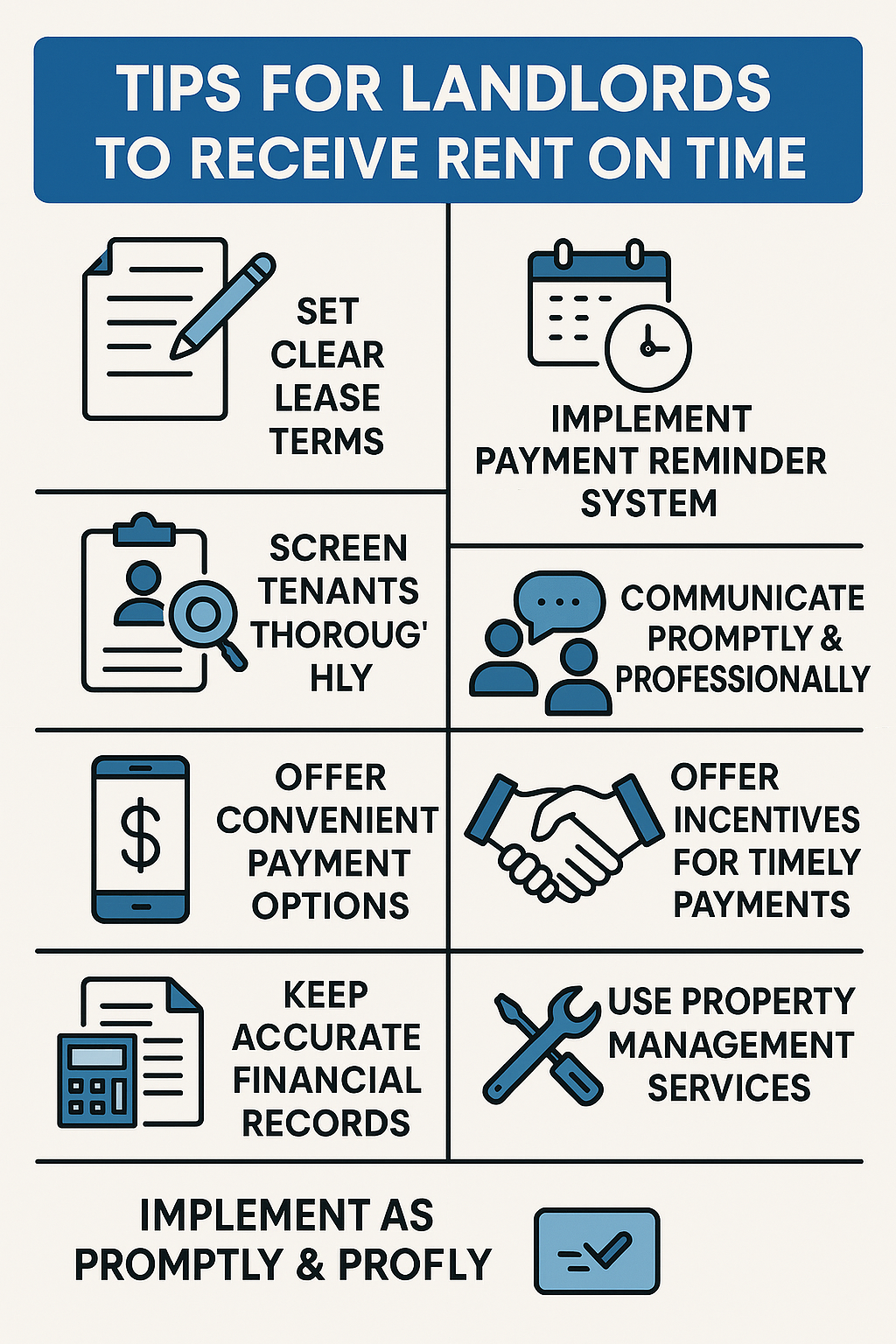
Managing rental properties comes with a host of responsibilities, and one of the most critical aspects is ensuring rent is paid on time. Regular, timely payments are essential not only for cash flow but also for the financial sustainability of your property portfolio. Below, we provide a comprehensive guide designed to help landlords establish effective systems, build strong tenant relationships, and ultimately secure consistent rent collection.
Establish Clear Lease Terms from the Beginning
Before any tenant moves in, it is vital to set expectations through a well-written lease agreement. The lease should clearly define:
-
Rent amount
-
Due date (e.g., the 1st of each month)
-
Accepted payment methods
-
Late fees and grace periods
-
Consequences of missed payments
Using unambiguous language prevents confusion and provides legal protection if rent collection issues arise. Ensure tenants read and understand the lease terms before signing.
Screen Tenants Thoroughly
One of the most effective ways to ensure timely rent payments is to select responsible tenants from the start. Conducting a rigorous tenant screening process that includes:
-
Credit checks
-
Employment and income verification
-
Rental history checks
-
References from previous landlords
Tenants with a stable income and good financial habits are far more likely to pay rent on time. Don’t skip this critical step — it’s the foundation of a hassle-free tenancy.
Offer Convenient Rent Payment Options
In today’s digital age, tenants expect easy, automated payment systems. By offering multiple payment options such as:
-
Bank transfers
-
Direct debit (auto-pay)
-
Credit/debit card payments
-
Online rent payment portals
You eliminate friction in the rent payment process. Auto-pay is particularly powerful — tenants can “set and forget,” which significantly reduces the chance of late payments.
Implement a Consistent Payment Reminder System
Even responsible tenants can forget a due date. That’s why an automated reminder system can make a big difference. Use:
-
Email notifications
-
SMS alerts
-
App notifications from rent collection platforms
Remind tenants of upcoming due dates, confirm payments received, and notify them if payments are late. This fosters communication and reduces the need for awkward follow-ups.
Communicate Professionally and Promptly
Maintaining open lines of communication with tenants builds trust and encourages responsibility. If a payment is missed, address the issue immediately but respectfully. Steps include:
-
Reaching out with a polite inquiry
-
Listening to the tenant’s explanation
-
Providing options if temporary hardship is involved (e.g., payment plans)
Timely and professional communication reduces friction and helps resolve issues before they escalate into legal disputes.
Enforce Late Fees and Penalties Fairly
While being understanding is important, so is consistency. A lease should include a clear late fee policy, and it should be enforced without exceptions. This ensures tenants understand the importance of paying on time. For example:
-
A flat fee (e.g., $50) after the 5th day of the month
-
A percentage of the rent (e.g., 5%) as a penalty
Enforcing consequences prevents a pattern of late payments from forming and sends a clear message that rent collection is taken seriously.
Build and Maintain Strong Tenant Relationships
When tenants feel respected and valued, they’re more likely to act responsibly. Consider:
-
Responding to maintenance requests quickly
-
Keeping the property in good condition
-
Offering lease renewal incentives for consistent payment history
Tenants who are happy in their home and feel respected are more likely to prioritize paying their rent on time.
Use Property Management Services When Necessary
If you own multiple units or don’t have the time to manage rent collection, consider hiring professionals who specialise in managing properties for rent. Property management companies:
-
Handle screening, leases, and rent collection
-
Provide digital platforms for payments
-
Serve notices and handle disputes
-
Offer tenant communication and enforcement services
While this involves a management fee, the peace of mind and reduction in late payments can easily offset the cost.
Keep Accurate Financial Records
Detailed records of all transactions and communications with tenants help you:
-
Identify patterns in late payments
-
Justify late fees and legal actions if necessary
-
Maintain tax compliance
Use modern property management software or accounting tools to keep accurate, up-to-date logs of every rent payment, fee, and communication.
Offer Incentives for Timely Payments
Reward systems can be surprisingly effective. Consider offering incentives such as:
-
A small monthly discount for early payments
-
Entry into a prize draw
-
Gift cards after 6 months of on-time payments
Positive reinforcement motivates tenants to stick to payment schedules and appreciate their rental arrangement.
Be Prepared to Act on Non-Payment
Even with the best systems in place, there will be times when tenants default. Be ready to:
-
Issue a formal notice of non-payment promptly
-
Begin tribunal or eviction processes if necessary
-
Consult legal professionals to ensure compliance with tenancy laws
Swift action protects your cash flow and demonstrates your commitment to consistent management.
Regularly Review and Adjust Your Rent Collection Strategy
Rental markets, tenant expectations, and technology are always evolving. Review your systems annually to determine:
-
Are your payment methods still the most convenient?
-
Could new platforms streamline the process?
-
Are your lease agreements still in line with current laws and market standards?
Proactively improving your strategy helps future-proof your rent collection processes.
Conclusion
Ensuring timely rent payments is a multifaceted task that requires proactive planning, clear communication, and strategic enforcement. By combining technology, professionalism, and thoughtful tenant engagement, landlords can create a streamlined rent collection process that minimises risk and maximises profitability. Whether self-managing or working with experts in management properties for rent, the key lies in consistency, clarity, and adaptability.